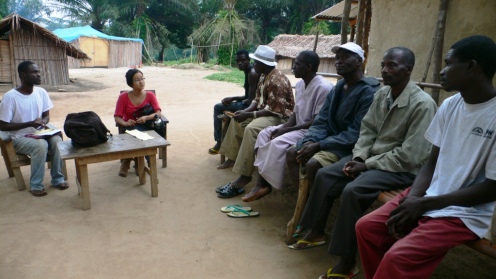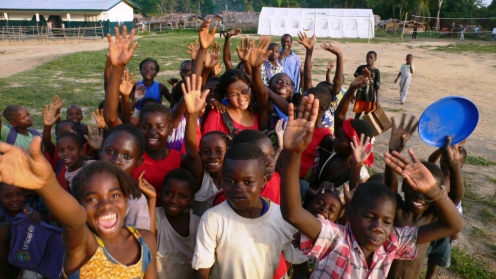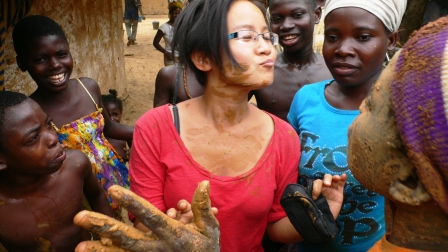 
 字體:小 中 大
字體:小 中 大 |
|
|
|
| 2011/09/14 14:18:34瀏覽1662|回應33|推薦116 | |
賴比瑞亞為美國黑奴所建立之國家,於1847年獨立,為非洲最早之共和國,憲政制度亦沿襲美國採總統制。聯合國維和部隊現正在賴比瑞亞進行部署,該部隊為規模空前之聯合國維和力量。賴國人口319餘萬人,其中13個非洲土著民族為賴國最主要之族群,佔總人口95%。以農牧為主要產業,以玉米為主食。 女兒去以前﹐ 一如既往﹐我們當然又是擔心一番﹐ 怕那兒有瘧疾等疾病﹐ 怕她吃不好﹐住不好﹐萬一生病﹐找不到好醫生。 一如既往﹐ 她叫我們不必擔心。我天天數算她的歸期, 直到九月二日,她飛機抵達﹐才鬆一口氣。感謝主﹐ 又平安帶領她走過一段險路。 她在賴比瑞亞時寫的日記裡 ,有一篇特別引起我興趣. 題目為 “ 我喜歡身為中國人” (I love being Chinese) . 茲翻譯前五段 (文章太長了﹐ 打得手酸) 如下﹐當作她這次旅行的記錄。 ******************* 我喜歡身為中國人 (寫於2011﹐ 六月十七日) 我喜歡身為中國人﹐我曾這樣說過。而且﹐ 我還要再說一遍。 不管我走到天涯海角﹐ 這個文化總是如此熟悉﹐ 令我感到安心。 因為﹐ 無論身在何處﹐我總會碰到在那兒安身立命或是養家糊口的中國人。他們待我總是那麼友善﹐慷慨﹐ 對我如家人般親切. 而且﹐ 他們常常會請我到他們家去吃中國菜﹐ 以解我思鄉之情。 和老中最近一次的接觸是那天﹐ 在聯合國維和部隊基地附近﹐ 遠遠得﹐我看到一個大紅燈籠和寫著增進與賴國友誼的綵旗﹐ 會議完﹐ 我就徑自來到那掛旗子的家門口。門口那個戴著藍色頭盔的年輕男孩好奇得看著我。 “ 你是中國人嗎? ” 我以一口破國語問他. “ 是啊﹐ 妳也是嗎 ? 可是, 我覺得妳不像中國人耶 ”﹐ 他很驚訝得說﹐ 轉身叫另一個和他差不多年輕的男孩﹐ 於是﹐ 他請我進去他們的小屋子裡坐坐﹐ 聊天。 原來他們兩個是聯合國駐賴比瑞亞的軍人。但他們的主要任務其實是保護大陸在賴國的建設隊﹐ 他們聊著中國政府怎樣把食物運來這國家﹐ 他們不准在基地外隨便走動﹐ 只能在裡面守衛﹐ 他們說他們的日子好無聊﹐真羨慕這兒非政府單位工作人員行動的自由。 那個 22歲 的說他恨不得早點回國﹐ 另外那個24 歲的比較沒那麼愛說話﹐ 只說他還想再在這國家留久一點。一如往常﹐我們聊著國內的食物有多好吃﹐ 國外找到好的中國食物有多難﹐ 他們還告訴我一些中國人來賴比瑞亞討生活的故事。知道我還沒吃飯後﹐ 他們趕快去廚房找東西來請我吃﹐找到一雙筷子﹐ 一些巧克力﹐一罐豆子和一些飲用水。 我一直說﹕ " 不好意思" 他們堅持說﹕" 中國人在國外就要像家人般彼此幫助。" 他們說附近的一些中國警察和生意人也常來基地找他們吃飯打籃球﹐海外的中國人就是要互相照顧。 *********************** 日記原文 I love being Chinese June 17, 2011 I love being Chinese. I’ve said it before, and I’ll say it again. This culture, it’s something so reliable and familiar no matter where I go. I have never been in a country and not found a fellow Chinese person there, who has made their life there, or at least who is working there. The Chinese are everywhere. And they are always kind, generous, treat you like family, and most importantly, feed you. My most recent encounter was in Zwedru, Grand Gedeh County, on the UNMIL compound. From a distance, I saw the red lanterns and broad colorful signage with Chinese characters proclaiming friendship and peace with Liberia. After the coordination meeting and a brief meeting with FAO folks, I decided not to go directly to the garage where the poor pickup that had brought us was being serviced, but instead talk to some of my brethren. So I sauntered over to the gate where a young Chinese boy in blue helmet clutching an automatic was glancing over at me. “ni shi zhong guo ren ma?” i asked in my pathetically broken Chinese. “ay? shi ah. wo jue de ni bu shi zhong guo ren,” he said in surprise. he called over a lieutenant, an equally young chinese boy, and he invited me into the little room where he was holding his post and we chatted. They were here as UN soldiers, but their main mandate was to protect the Chinese construction teams that were in Liberia. They explained to me how the Chinese government shipped food in, how they weren’t allowed outside the compound but to do their guarding duties, how life was a bit boring there and they envied the NGO people who could move around more freely in the country. The younger soldier (22) could not wait to “huie guo,” while the lieutenant (24) expressed some interest in continuing on abroad, but with a private outfit. as usual, our conversation wandered to the great food that exists in China, and how it was difficult to find such good food outside of “guo ne”. they also told me stories about other Chinese folks who had come to Liberia and decided to stay and make their lives here. After finding out I hadn’t yet eaten, they rushed about to find me food, eventually turning up with a can of lentils and some chocolates and some chopsticks. Another soldier worried himself with finding me water to drink. I kept saying “bu hao yi shi”, but they insisted, saying that Chinese people help each other out and are family when we are abroad. It was the same with a small team of Chinese policemen and a Chinese business owner in Zwedru who often came into their compound to eat with them or play basketball. Chinese people look out for one another here. I’ve gotten different perspectives on the presence of China in Africa from people, but most of them have been resoundingly positive. It seems the two people I met on the first day who criticized China for not employing locals and not “contributing to the local economy” were exceptions to the rule. In general, most people have praised the Chinese work ethic, and the fact that they get the job done well, without handing it over to the government who would just “eat the money”. They admire the beautiful buildings, schools and hospitals that the Chinese have constructed (though my engineer mentioned that they weren’t particularly long lasting because of their fast-curing process they use for the concrete) and never hesitate to train locals to be able to use the equipment they bring in and to do the job the same way they do it. “I’ve noticed that technology has advanced significantly since the Chinese came here,” Yao commented. And it has driven the costs of other technologies from the west down. Plus, the Chinese imports have allowed everyone to have a chair, a desk, buckets for water and other commodities that they could previously not afford. “The Chinese work hard,” my driver commented as we passed road construction with two old Chinese men supervising and locals operating the bulldozers. “The Chinese are our friends.” Yao told me about a Chinese man he knew who had married a Liberian woman and settled down in Monrovia, selling mineral water. I told him it was good to hear, since stories of integration of Chinese into other cultures is always somewhat rare. He smiled, “yes, but it’s not quite fair. Chinese women should also marry Liberian men. That way the Chinese will not leave this country.” I told him we could set up a training session for all Liberian men on how to seduce Chinese women. First thing, we’ll work on everyone’s cv…
|
|
| ( 創作|散文 ) |











